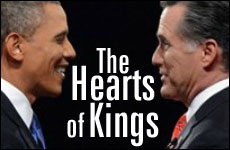 Iran’s Attack on Israel
Iran’s Attack on Israel


4 min read
The presidential election looms. Does it really matter who wins?
On the eve of the U.S. presidential election, it seems as though everyone is holding their breath, awaiting the result of a long, bitterly-fought, and very expensive campaign.
So much is at stake. On a wide array of economic, social and foreign policy issues, the candidates’ visions are so vastly different. So much appears to ride on who will be steering the country – indeed, the free world – through these crucial next four years. This election is arguably the most crucial in recent history.
Yet in one key regard, this election may not be so “decisive” after all.
The Book of Proverbs (21:1) states:
"Like streams of water, the heart of the king is in the hand of God. He directs it anywhere He wishes."
What does this verse mean exactly? Does it imply that world leaders are mere puppets of the Almighty? If so, why should we even bother voting at all?
Even more essentially: Is it not a foundation of Jewish belief that human beings possess free-will – the ability to choose between right and wrong? (see Maimonides – Teshuva ch. 3)
The answer is that free-will is not an absolute concept. Although God grants free-will to each individual, this privilege may be suspended when it comes to leaders whose decisions can determine the fate of an entire nation.
As compared to private citizens, leaders clearly enjoy superiority in terms of honor and power. And yet, since their choices impact so many lives, God will – for the purpose of guiding the course of history – sometimes revoke a leader’s free will. (see Abarbanel – Genesis 45; Rabbi Dovid Shlomo Eibshitz)
With this we can understand a key element of the biblical Exodus story. God desired to bring the Israelites out of Egypt amidst “great signs and wonders,” to conclusively demonstrate His unparalleled power. In order to achieve that, God needed Pharaoh to “play along,” to continually deny the Jews the option of leaving – despite the ongoing hardships that such denial imposed on Egyptian society. And so, God "hardened Pharaoh’s heart," removing his free-will and in effect forcing him to refuse Moses’ repeated requests to “Let my people go.”
Public Mandate
The story is told that when Israeli Prime Minister Menachem Begin visited New York in the 1970s, he insisted on meeting with the great Torah Sages of the generation. In the course of what proved to be a very fruitful conversation, Begin told the Sages that he suffered from a heart condition and asked them to pray for him. Rabbi Yaakov Kaminetzky replied by quoting the verse in Proverbs: "You don't need our prayers. The heart of the king is in the hand of God."
So what does all this have to do with the presidential election?
What ultimately determines the course of history is neither political platforms or coalition agreements. Rather, "Like streams of water, He directs it anywhere He wishes." The Midrash explains: Just as water, when put in a vessel, can be tilted to any side that you wish, so too, when a person rises to greatness, his heart is given into the hand of God.
And yet, this does not mean that we should be nonchalant about the election and don’t need to cast a ballot. Rather, our own free-will demands that we exert an appropriate effort to influence the world. The Midrash (Yalkut Shimoni – Mishlei 21) reveals a great secret:
Although God will not allow a leader to make a unilateral free-will decision that determines the fate of so many people, God will grant a ruler the latitude to decide based on the mandate given by the people. In other words, if the generation is worthy, God inclines the king's heart to good; if not, He inclines him to do evil.
That is why the election is indeed so important. By choosing our leaders, in large part we determine our own fate. A leader’s “political moves” are never contrary to the will of the people – but rather an affirmation of our own deepest intent upon having “freely chosen” this leader in the first place.
Or in the words of H.L. Mencken: "Democracy is the theory that the common people know what they want – and deserve to get it good and hard."
So as we approach an election that promises to be a nail-biter, we can maintain a sense of calm knowing that no matter who wins, the ultimate outcome is safe and secure in the hands of Heaven.
